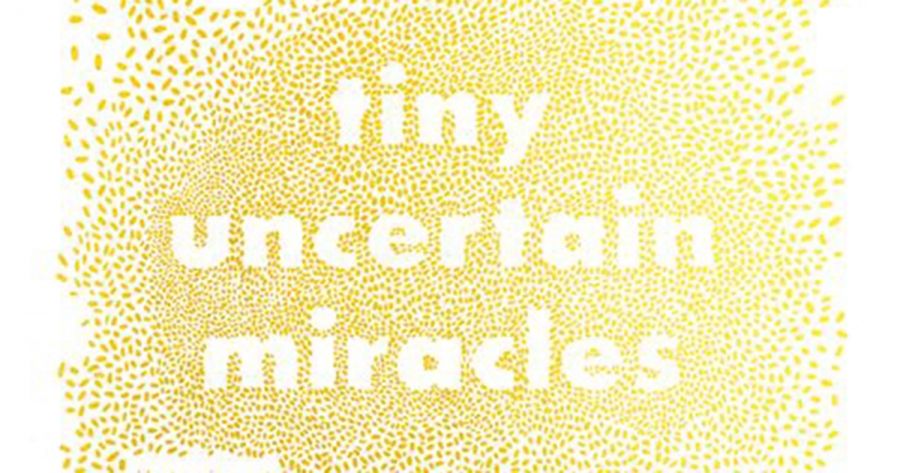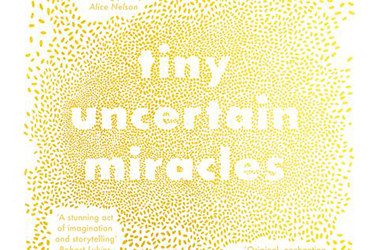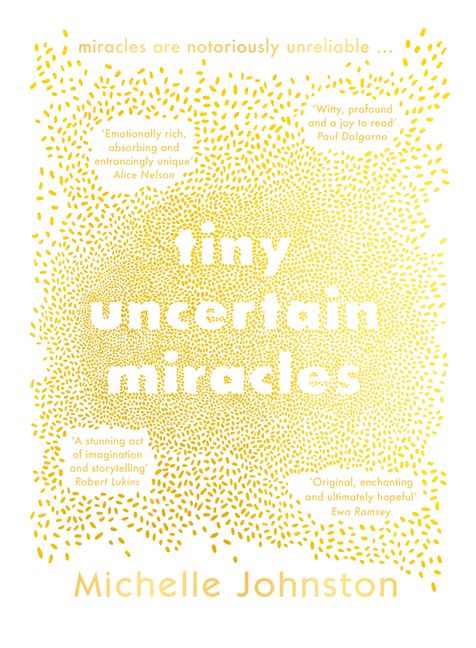
- Free Article: No
- Contents Category: Fiction
- Review Article: Yes
- Article Title: How magical can we be?
- Article Subtitle: Looking for God in the emergency room
- Online Only: No
- Custom Highlight Text:
'The most beautiful experience we can have is the mysterious. It is the fundamental emotion that stands at the cradle of true art and true science.’ Albert Einstein wrote these words, originally in German, in his book The World As I See It (1934). He went on to describe the ‘knowledge of the existence of something we cannot penetrate’ as constituting ‘the truly religious attitude’, adding he ‘cannot conceive of a God who rewards and punishes’.
- Featured Image (400px * 250px):

- Alt Tag (Featured Image): Naama Grey-Smith reviews 'Tiny Uncertain Miracles' by Michelle Johnston
- Book 1 Title: Tiny Uncertain Miracles
- Book 1 Biblio: Fourth Estate, $32.99 hb, 327 pp
- Book 1 Cover Small (400 x 600):

The intersection of theology, science, and fable – as much historical as it is literary – is apparent from the epigraph page, which quotes from the Book of Job, Isaac Newton’s Praxis, and Rumpelstiltskin by the Brothers Grimm. Each quote mentions gold, but more is suggested: Job is a central text in the theological study of suffering, while Praxis is an alchemical treatise that reminds us that modern science did not emerge whole like Athena out of Zeus’s head but rather was wrested from the jaws of superstition through the persistent application of reason (the British economist John Maynard Keynes wrote that ‘Newton was not the first of the age of reason: he was the last of the magicians’).
The question of meaningless suffering that dogs Marick is amplified tenfold in the setting of an emergency department. Marick’s first visit as hospital chaplain is to the putrid-smelling room of a sixteen-year-old girl whose life has ended violently. His jaw hangs, ‘slack on its hinges’, as he discovers ‘a different God from the one floating among the sermons and the choirs up the hill’. Stunned, Marick wonders, ‘What sort of God presides over circumstances such as this?’
Johnston, who is a staff specialist at the Royal Perth Hospital Emergency Department and a Professor of Emergency Medicine at St John of God Murdoch Hospital, is well placed to describe the brutal reality of an inner-city trauma centre. Tiny Uncertain Miracles touches on such difficult subjects with a light hand and a gentle tone, delivered through clean, supple, accessible prose. There is a deceptive simplicity to the work, which, on closer inspection, turns out to be the elegance of a right fit. Johnston has skilfully crafted a cohesive and engaging tale.
While I felt confused by various characters’ reactions to the gold-producing bacteria (would the average modern Australian, let alone a scientist like Hugo, posit ‘alchemy’ or ‘miracle’ rather than ‘interesting scientific discovery’?), a series of sub-plots sweeps the reader along as Johnston explores faith, doubt, and the human hunger for the mysterious.
Years ago, a friend of mine – a scientist studying nanotechnology – described a similar sentiment to me, quoting from the song ‘Hur lyckliga kan vi bli’ (2006) by Swedish singer-songwriter Emil Jensen: ‘How happy can we be / we who know what the stars are made of / And how magical can we be / when we know what brains are made of.’
The reader’s next thought is on the risks this kind of thinking could engender in today’s world, where false news travels faster than fact. Johnston anticipates this. Marick asks Hugo: ‘But hasn’t this sort of thinking opened the door to the plague of conspiracy theories? By downgrading rigorous truths to ideas that can be trumped by opinion?’
Johnston leaves no doubt as to Marick’s views on conspiracy theories: on hearing an anti-vaxxer ‘influencer’ encourage people to ‘rise up against health officials’, Marick ‘would almost have preferred the Devil’. Marick’s own hearing loss is the result of a missed measles vaccination in infancy. By establishing the parameters of her enquiry, Johnston creates a thoughtful space in which readers are free to explore the questions of science, God, and faith as philosophical matters.
While the novel’s cast will elicit a range of responses (wifely and motherly characters got a rough trot by my reckoning), a character that sticks in the reader’s mind is the nameless emergency doctor whom Marick occasionally spots. He finds her sitting outside the hospital, ‘staring beyond the bitumen, beyond everything’, or else trying to write in a notebook, though ‘the stories in this hospital defy translation into words’. Every encounter with her offers sober insight into the reality of an emergency physician, of ‘trying to patch up all the broken things at the final stop’. She rejects suggestion of a new wellness space for staff with the assertion that ‘We don’t need wellness and yoga and chat. We need society fixed.’ It is this worn and weary doctor who impresses upon Marick that perhaps what we do is more important than what we believe. In this, Michelle Johnston leaves the reader with an empowering message of hope and meaning.


Comments powered by CComment